#clio goddess
Explore tagged Tumblr posts
Text

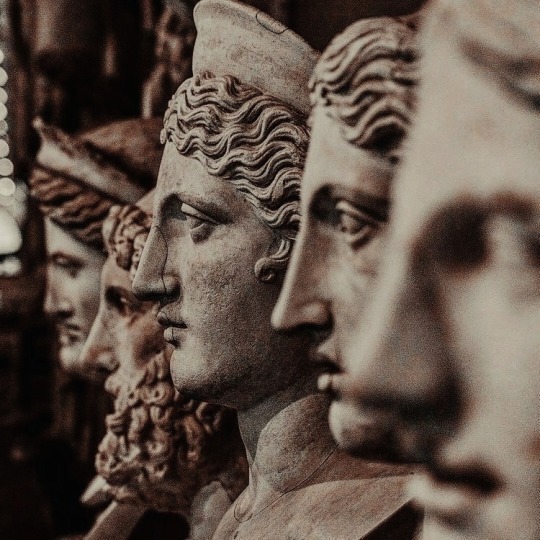
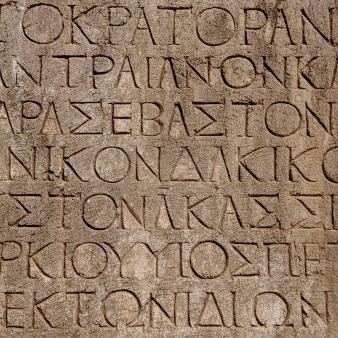


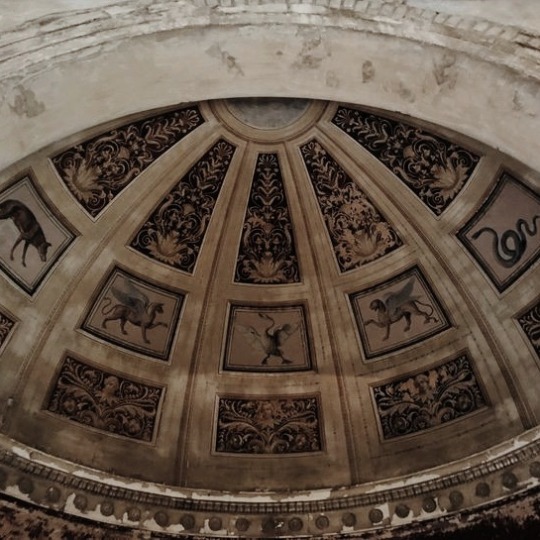
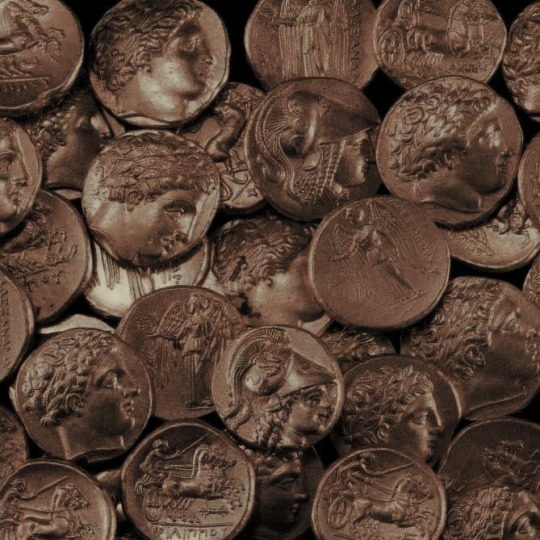

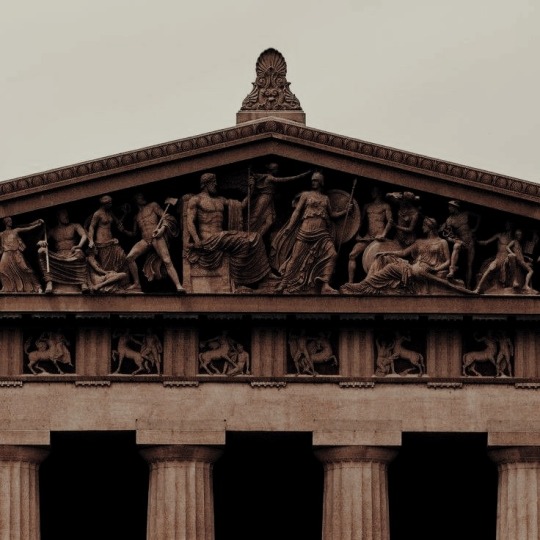
𝒌𝒍𝒆𝒊𝒐 ; 𝒈𝒐𝒅𝒅𝒆𝒔𝒔 𝒎𝒖𝒔𝒆 𝒐𝒇 𝒉𝒊𝒔𝒕𝒐𝒓𝒚 📚✒
[please reblog or like if you saved]
#kleio#clio#goddess clio#clio goddess#greek god#greek gods#greek goddess#greek god aesthetic#greek god art#greek pantheon#greek paganism#greek pagan#greek polytheism#greek polytheist#greek myth#greek myth aesthetic#greek myth art#greek mythology#greek mythology aesthetic#greek mythology art#hellenism#hellenistic#hellenic paganism#hellenic pagan#hellenic polytheism#hellenic polythiest#hellenic pantheon#hellenic gods#hellenic deities#mousai
253 notes
·
View notes
Text
Greek Gods 101: Clio
Clio is a Mousai of history and records. Excluding the universal offerings, some common offerings include:
Books
History Books
Textbooks
Scrolls
Recycled Paper
Journals
Quill
Ink
Other People’s Journals (i.e. Virginia Woolf’s)
Flashdrives/USB Drives
Cameras or Photos
For devotional acts, some activities that can be done for her include:
Coffee Staining Scrolls and Papers
Learning About Major Historical Events
Learning About Major Historical People
Memorizing Dates and Places
Keeping a Journal
Studying History
Learning How to Keep Records
She is not celebrated in any Athenian holidays.
#clio#clio goddess#clio muse#clio mousai#deities#hellenism#helpol#hellenic#hellenic pagan#hellenic polytheism#hellenic community#hellenic polytheist#hellenic deities
42 notes
·
View notes
Text


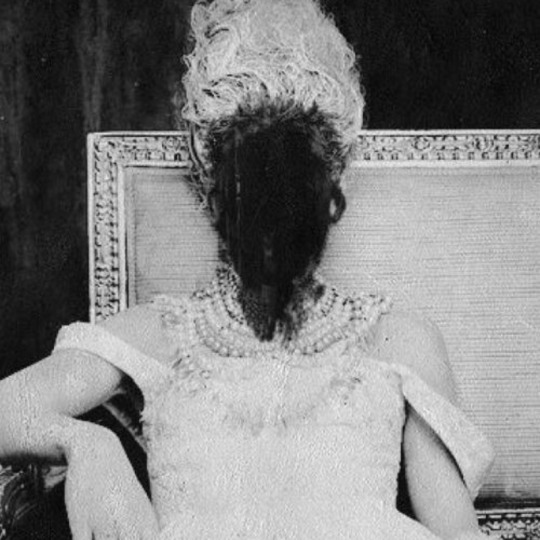






greek mythology: clio
clio is the muse of history, she is the mother of hyacinth in some myths, and is depicted with an open parchment scroll, a book, or a set of tablets.
346 notes
·
View notes
Text
My Hymn to the Muses
Since I can apparently write poetry now, I've decided to begin work on a hymnal. It's going to be a long-term project. As is proper, I've begun with the Muses. (I also really could use their help right now.) I was sobbing while writing this, so, that's how I know I'm on the right track.
To the Muses O Muses, from whom all stories flow Like the waters of the Hippocrene, that pours from Helicon’s towering heights onto the sacred planes of Greece; Daughters of Zeus and mothers of song, whose voices sound like chiming bells, heard in the ripples of the stream and the calling of the wind, singing stories older than the many languages of men; Your voices sing within my soul And always have, since I was born.
Urania, who in my youth led me to a sacred stream, and turned my face up to the stars; Calliope, who leads me through the lengthy stories that I tell; Terpsichore, who compels my limbs to express what’s in my heart; Euterpe and Erato, who with their sweet voices, charm my soul; Polyhymnia, who speaks to me now, encouraging me to praise the gods; Clio, she who calls my glance back to the rich lore of the past; Thalia and Melpomene, the witty players on life’s stage, who remind me to enjoy the show, and teach me how to cope with endings.
Pegasus brought me to you, Once, very long ago. And in that time you’ve taught me well How to sing and dance and write, the many arts of lorekeeping. Sisters, now I call to you-- fill me with the voice divine, so that always, always the words will come.
#poetry#my poetry#hymns#hymn to the muses#the muses#the nine muses#mousai#hellenic polytheism#hellenic pagan#helpol#hellenic paganism#hellenic devotion#greek gods and goddesses#hellenism#hellenic worship#hellenic deities#hellenic polythiest#calliope#urania#polyhymnia#euterpe#erato#terpsichore#clio#thalia#melpomene
47 notes
·
View notes
Note
I'm curious, who are your favourite gods/goddesses?
Number one favorite will always be Hyacinthus ❤️
(he's more like a god-hero/pre-Hellenic god)

Number two is a tie between Polyboea and Apollo!


And number three is a tie between Demeter, Persephone, Artemis, and Clio!




#hyacinthus#polyboea#apollo#demeter#persephone#artemis#clio#greek gods#greek goddesses#greek mythology#tumblr ask#ask me anything#anon ask#The Pen writes answering letters#statues#paintings
29 notes
·
View notes
Text
Clio, writing as she's watching the ruins of Troy from above: ...aaaaand that's it! After ten long years I've finally finished this epic poem. Gotta call it Troy Story and then credit an imaginary dude called Homer for it.
Athena: Good, because you're gonna write another one for ten more years. *points at Odysseus*
Clio: ...
Clio: I hate you all.
#Plot Twist: “Homer” is Clio's pen name.#greek mythology#greek gods#greek goddesses#athena#clio#the muses#the iliad#the odyssey#greek mythology memes#incorrect greek mythology
32 notes
·
View notes
Text



Let’s take a minute to think about how sweet a reunion between Hyacinth and Clio would be.
Girl lost her only son, then one day had him back in her arms for all of eternity:
#saw once that when Hyacinth was resurrected he had something of a beard going on#anyways#Clio and her baby forever#this is song is from epic the musical and is technically about Odysseus and Telemachus#but we’re just gonna ignore that part#hyacinthus and clio#clio and hyacinthus#muse clio#goddess Clio
21 notes
·
View notes
Text
Clio after Aphrodite manipulated her into falling in love with a mortal:
youtube
#imagine beefing with THE GODDESS OF HISTORY#now she’ll make sure all the terrible shit you did will be remembered#for all eternity#and even make the bad things you did even worse#that’s just how historians are#greek mythology#ancient greek mythology#greek pantheon#muses#clio#Clio muse#Aphrodite#aphrodite greek mythology#aphrodite goddess#Youtube
14 notes
·
View notes
Text
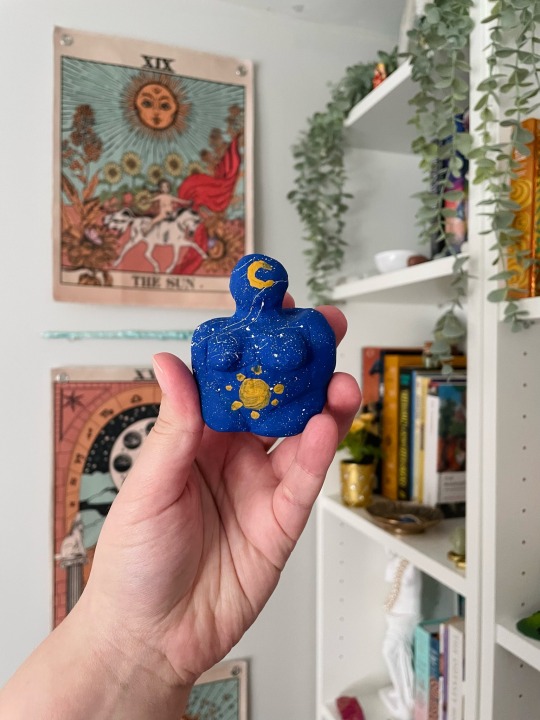
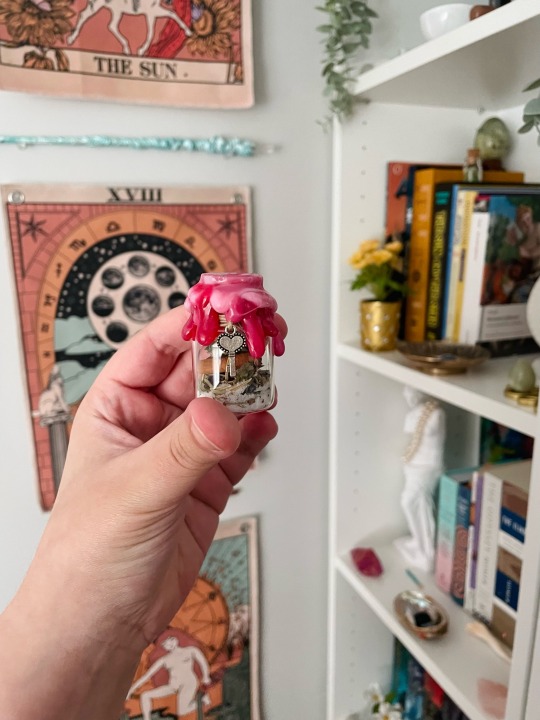
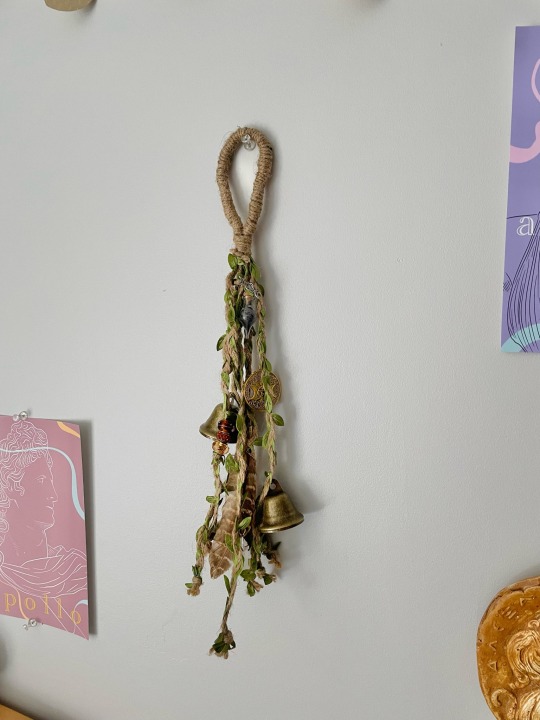

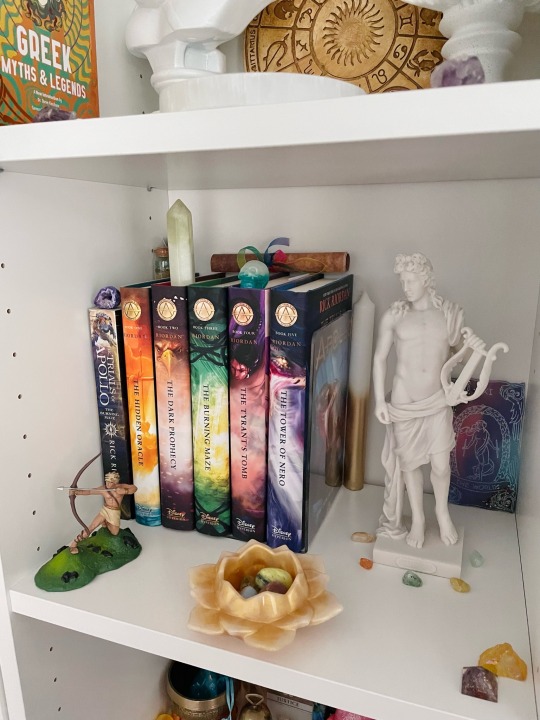
I went to my first pagan event this weekend, and while I couldn’t stay very long due to the heat, I had a great time! I picked up a few things, including this beautiful sky goddess statue, a love spell, a set of witch bells, and a blue agate slab with some art on it. I also now have a scroll to represent Clio, this is something I’ve had on my shopping list for awhile, and this one happened to come with something my boyfriend bought. He didn’t want it and I thought it felt perfect for Clio, so now it sits on my altar!
#hellenism#paganism#witchcraft#hellenic polytheism#apollo#apollon#altar#apollo worship#artemis#pagan altar#Clio#klio#history#scroll#goddess#spells#love spell#blue agate#crystals#muses
20 notes
·
View notes
Text
Statistics of Apollo's Lovers
I was wondering just how unfortunate of a love-life our boy Apollo had, so - as one does - I did the research, math, and writing of said love-life.
such is the life of an adhd teen :)
In total, there are 62 people on this list. I have them separated into eight groups; Immortal, Immortal & Rejected, Lived, Died, Rejected & Died, Rejected & Cursed, Rejected & Lived, and who were Rejected by Apollo
Disclaimer: I am not a historian nor an expert in Greek Mythology, I am just a very invested nerd in Mythology, and in Apollo's mythology in general, and got curious about what his rap sheet actually looks like.
Sidenote: There will be some "lovers" not on this list. Reasons being;
No actual literary sources behind them
Said literary sources are dubious at best
Not enough information is given about the nature of their relationship to make an accurate take
So if somebody isn't on this list, it's because of one of those three reasons. Although there is still a chance I missed somebody! :)
Also, no RRverse lovers include in this list. Sorry my fellow ToA fans.
*I am currently investigating the legitimacy of 2 more potential lovers. As soon as I have reliable sources, I will get them on here ASAP. Their inclusion, however, will not change the overall conclusion. 👍
(Edited 01/15/25 - ALL SECTIONS SOURCED)
Let's begin! :D
Immortal Lovers
Calliope: muse of epic poetry. Mother of Hymenaios and Ialemus (Pindar's 3rd Threnos) by Apollo.
Clio: muse of history
Erato: muse of love poetry
Euterpe: muse of music
Polyhymnia: muse of hymns/sacred poetry
Melpomene: muse of tragedy
Thalia: muse of comedy. Mother of the Corybantes (The Bibliotheca by Pseudo-Apollodorus) by Apollo.
Terpsichore: muse of dance
Urania: muse of astronomy
Boreas: the North Wind. The Boreads called Apollo "beloved of our sire" in Apollonius of Rhodes's Argonautica.
Rhetia: alternate mother of the Corybantes by Apollo. (Strabo's Geography 10.3.21)
11 lovers total here.
10 Female, 1 Male
Immortal & Rejected
Hestia: goddess of the Hearth (Hymn to Aphrodite)
1 Interest. Female.
Lovers Who Lived:
Branchus: mortal shepherd, gifted prophecy (Conon's Narrations 33 & Callimachus's Iambus)
Rhoeo: mortal princess, eventually married an apprentice of Apollo (Diodorus Siculus's Bibliotheca historica 5.62 and Tzetzes on Lycophron 570)
Ourea: demigod daughter of Poseidon, dated Apollo during his punishment with Laomedon; had a son named Ileus, after the city of Troy (Hesiod's Catalogues of Women Fragment 83)
Evadne: nymph daughter of Poseidon, Apollo sent Eileithyia & (in some texts) the Fates to aid in their son's birth (Pindar's Olympian Ode 6)
Thero: great-granddaughter of Heracles, described as "beautiful as moonbeams" (Pausanias's Description of Greece 9)
Cyrene: mortal princess-turned-nymph queen, kick-ass lion wrangler, and mother of two of Apollo's sons - Aristaeus (a god) and Idmon (powerful seer) (Pindar's Pythian Ode 9.6 ff. and Nonnus's Dionysiaca and Callimachus's Hymn to Apollo 85)
Admetus: mortal king, took great care of Apollo during his second punishment, Apollo wingmanned him for Alcestis's hand - basically Apollo doted on him <3 (Callimachus's Hymn II to Apollo and Apollodorus's Bibliotheca 1.9.15 and Hyginus's Fabulae 50–51, and also written about by Ovid and Servius)
Hecuba: queen of Troy, together they had Troilus.
It was foretold that if Troilus lived to adulthood, Troy wouldn't fall - unfortunately, Achilles murdered Troilus in Apollo's temple. When the Achaeans burned Troy down, Apollo rescued Hecuba and brought her to safety in Lycia. (Stesichorus's Fr.108)
Hyrie/Thyrie: mortal. mothered a son by Apollo. Their son, Cycnus, attempted to kill himself after some shenanigans and his mother attempted the same. Apollo turned them into swans to save their lives. (Antoninus Liberalis's Metamorphoses 12 and Ovid's Metamorphoses 7.350)
Dryope: mortal. had a son named Amphissus with Apollo, who was a snake at the time. Later turned into a lotus flower, but it had nothing to do with Apollo so she's still on this list. (noncon; written by Ovid in Metamorphoses 8 CE/AD and later by Antoninus Liberalis in his own Metamorphoses sometime between 100-300 CE/AD)
Creusa: mortal queen. had a son named Ion with Apollo (Euripides's Ion). Please check out @my-name-is-apollo's post for more details because they make some good points about what's considered "rape" in Ancient Greece. I expand on this further at the end of the post.
Melia: Oceanid nymph. Had a son w/h Apollo named Tenerus. (Pausanias's Descriptions of Greece 9.10.5–6)
Melia was said to be kidnapped, and her brother found her with Apollo. He set fire to Apollo's temple in an effort to get her back, but was killed. Melia and Apollo had two kids - but here's the interesting part. Melia was highly worshiped in Thebes, where her brother found her. She was an incredibly important figure in Thebes, especially when connected with Apollo. She and Apollo were essentially the parents of Thebes.
As I read over their story, it sounded like (to me, at least. it's okay if you think otherwise!) that Melia just absconded/eloped with Apollo.
Was kidnapping an equivalent to assault back then? Perhaps. But it's still debated on whenever or not that's true. However, one thing I've noticed reading up on these myths is that when Apollo does do something unsavory, the text says so.
It never says anything about Apollo doing anything to Melia. Her father and brother believe she was kidnapped, but, like mentioned previously, it seems far much more likely that she just ran off with her boyfriend or something.
But that's just my interpretation.
Moving on! :)
Iapis: a favorite lover. Apollo wanted to teach him prophecy, the lyre, ect. but Iapis just wanted to heal :) so Apollo taught him healing :) (Smith 1873, s.v. Iapis)
Aethusa: daughter of Poseidon & the Pleiad Alcyone. Mother of Linus and Eleuther. She is the great-great grandmother of Orpheus. (Apollodorus's Bibliotheca 3.10.1 and Pausanias's Descriptions of Greece 9.20.2 and Suida, s.v. Homer's Of the Origin of Homer and Hesiod and their Contest, Fragment 1.314)
Acacallis: daughter of King Minos. there's a lot of variation on whether or not she had kids with Hermes or Apollo. Some say she had a kid with each. (Stephanus of Byzantium, s.v. Kydōnia (Κυδωνία and Scholia on Apollonius Rhodius, 4.1492)
Chrysothemis: nymph queen who won the oldest contest of the Pythian Games - the singing of a hymn to Apollo. She had three daughters, and one of them is said to be Apollo's. (Pausanias's Descriptions of Greece 10.7.2 and Hyginus's De Astronomica 2.25)
Corycia: naiad. had a son with Apollo. the Corycian Cave north of Delphi is named after her (Hyginus's Fabulae 161)
Leuconoe (also Choine or Philonis): daughter of Eosphorus, god of the planet Venus, and mother of the bard Philammon. (Hyginus's Fabulae 161) She was killed by Diana for her hubris.
Melaena (also Thyia or Kelaino): mother of Delphos, member of prophetic Thriae of Delphi. Priestess of Dionysus. (Herodotus's Histories 7.178.1)
Othreis: mothered Phager by Apollo, and later Meliteus by Zeus. (Antoninus Liberalis's Metamorphoses 13)
Stilbe: mother of Lapithus and Aineus by Apollo. (Diodorus Siculus's Library of History 4.69.1 and Scholia on Apollonius Rhodius, 1.40 and Scholia on Apollonius Rhodius, 1.948)
Syllis (possible same as Hyllis, granddaughter of Heracles): mothered Zeuxippus by Apollo. (Pausanias's Descriptions of Greece 2.6.7)
Amphissa: Apollo seduced her in the form of a shepherd. They had a son named Agreus. (Ovid's Metamorphoses 6.103 and Hyginus's Fabulae 161)
(hey, has anybody else noticed that 'Apollo disguising himself' seems to only be a thing in Roman literature?)
Areia (or Deione): had a son named Miletus. Hid him in some smilax. Her father found him and named him. (Apollodorus's Bibliotheca 3.1.2)
Arsinoe: she and Apollo had a daughter named Eriopis. (Hesiod's Ehoiai 63 and Scholia ad Pindar's Pythian Ode 3.14)
Queen of Orkhomenos (no name is given): Mother of Trophonius (Pausanias's Descriptions of Greece 9.37.5)
(my fellow ToA fans will recognize that name haha).
Hypermnestra: Either Apollo or her husband fathered her son Amphiaraus. (Hyginus's Fabulae 70)
(sidenote: @literallyjusttoa suggested that Apollo was dating both Hypermnestra and Oikles, and I, personally, like that headcannon)
Manto: Daughter of Tiresias. Apollo made her a priestess of Delphi. They had a son named Mopsus. When Apollo sent her to found an oracle elsewhere, he told her to marry the first man she saw outside of Delphi. That man turned out to be Rhacius, who brought her to Claros, where she founded the oracle of Apollo Clarios. (Apollodorus's Bibliotheca E6. 3)
Later, another man named Lampus attempted to assault her, but was killed by Apollo. She is also said to be a priestess who warned Niobe not to insult Leto, and to ask for forgiveness. Niobe did not. (Statius's Thebaid 7 and Ovid's Metamorphoses 6)
(Dante's Inferno places her in the eighth circle of hell, and let me just say- what the FUCK Dante! What did Manto ever do to you, huh??!! Don't do my girl dirty!!)
Parthenope: granddaughter of a river god. Mothered Lycomedes by Apollo (Pausanius's Descriptions of Greece 4.1)
Phthia: prophetess. called "beloved of Apollo". Mother three kings by him; Dorus, Laodocus, & Polypoetes (Apollodorus's Bibliotheca 1.7.6)
Procleia: Mother of Tenes, son of Apollo, who was killed by Achilles before the Trojan War. Daughter of King Laomedon, king of Troy. (Apollodorus's Epitome 3. 26)
Helenus: prince of Troy. Received from Apollo an ivory bow which he used to wound Achilles in the hand. (Photius's 'Bibliotheca excerpts')
Hippolytus of Sicyon: called "beloved of Apollo" in Plutarch's Life of Numa. I don't think this guy is the same as Hippolytus, son of Zeuxippus (son of Apollo), king of Sicyon Pausanias talks about in his Description of Greece. That would be a little weird taking the whole family tree into account - though it's never stopped other gods before. *shrug*
Psamathe: nereid, said to be the personification of the sand of the sea-shore. (Conon's Narrationes 19)
She and Apollo were lovers, but never had any kids. When another man assaulted her, she had a son and abandoned him.
(He was found by some shepherds dw - wait, he was then torn apart by dogs. Nevermind.)
Back to her, her father ordered for her to be executed and Apollo avenged her death by sending a plague onto Argos and refused to stop it until Psamathe and Phocus/Linus (her son) were properly given honors.
(I really like how even though Linus isn't Apollo's kid, and that Psamathe wanted nothing to do with the kid, Apollo still considered him worth avenging too <3 )
Okay, in a previous incarnation of this post, I said there was a version where she is raped by Apollo...however, I can't find any sources to back it up😅 Even her wiki page doesn't mention rape, and Theoi's excerpt of Paunasias's Descriptions of Greece about her doesn't either.
So where did I hear about this supposed version? (Don't shoot)
Youtube. A youtube video about Apollo. Yeah...
Lesson, kids! Don't trust youtube videos on mythology! Yes, even if they dedicated lots of time to it! They can still get things wrong! In fact, don't even take my word for it! Do your own research <3
Hymenaeus: No, not his kid. This is a different Hymenaeus haha! This Hymenaeus is the son of Magnes, and comes from Megalai Ehoiai fr. 16, commonly attributed to Hesiod, and Antonius Liberalis's Metamorphosis. Legend states that while Apollo was preoccupied with Hymenaeus, baby Hermes stole his cows ;)
Euboia: Daughter of Macareus. Bore a son named Agreus. (Hyginus's Fabulae 161)
Alright. 36 lovers here.
6 Male. 30 Female.
34 are 100% consensual. Creusa is questionable, depending on who's translating/which tradition you go with. Dryope is noncon.
Lovers Who Died:
Hyacinthus*: mortal prince. we all know this one, right? Right? one and only true love turned into flower (okay that's my bias speaking but AM I WRONG?) (Plutarch's Life of Numa, 4.5; Philostratus the younger's Imagines; Pseudo-Apollodorus's Bibliotheca 1.3.3; Ovid's Metamorphoses 10.162–219; Bion's Poems 11; and various pieces of art)
Cyparissus: mortal. his DEER DIED and he asked Apollo to let him MOURN FOREVER so he was turned into a cypress tree (Ovid's Metamorphoses X 106ff)
Coronis: mortal princess. cheated on Apollo w/h Ischys, who in Fabulae was killed by Zeus. mother of Asclepius. killed by Artemis. (Pindar's Pythian Odes 3.5; Pausanias's Descriptions of Greece 2.26.6; Hyginus's Fabulae 202; Ovid's Metamorphoses 2.536 and 2.596; Hyginus's De Astronomica 2.40; Isyllus's Hymn to Asclepius 128.37 ff.)
There is another version of Asclepius's birth given by Pausanias in Descriptions of Greece 2.26.1-7, where Coronis exposes him on a mountain and Apollo takes him in.
Adonis: yes, THAT Adonis. he's in this category because. well. he died. rip (Ptolemy Hephaestion's New History Book 5)
Phorbas: Okay so Apollo's lover Phorbas and another Phorbas sometimes get mashed together so this is what I was able to gather.
Plutarch's Life of Numa 4.5 and Hyginus's De Astronomia 2.14.5 cites Phorbas as Apollo's lover. The other Phorbas is said to be a rival to Apollo in the Homeric Hymn to Apollo. Personally, I separate the two because it makes more sense with Phorbas the lover's overall story.
Here it is: The island of Rhodes fell victim to a plague of dragons or serpents, and the oracle said to summon Phorbas for help. He defeated the infestation, and after he died, Apollo asked Zeus to place him in the stars, and so Phorbas became the constellation Serpentarius, also known more widely as Ophiuchus (a man holding a serpent).
FORGET ORION AND HIS ONE-OFF MENTION OF BEING DIANA'S LOVER HERE IS A CONSTELLATION TRAGIC LOVE STORY!!!!!
(*Hyacinthus was resurrected, as celebrated in the Hyacinthia festival in Sparta. Nonnus's Dionysiaca 19.102 and Pausanias's Descriptions of Greece 3.19.4 supports this belief as well.)
5 lovers.
4 Male. 1 Female. All consensual.
Sidenote: QUIT BURYING THE GAYS GREECE!!!!
Love-Interests Who Rejected & Died:
Daphne: do i nEED to say anything? Nymph. turned into tree to escape.
Daphne and Apollo actually go back a bit. Their story was used to explain why the laurel was so sacred to Apollo. It's in Delphi, Branchus planted laurel trees around the temple he built to Apollo, the laurel was even sacred to Apollo's historical forebearer Apulu, an Etruscan god! (I have sources to back this up :3 along with an Essay.)
Apollo & Daphne first originate from Phylarchus, but we do not have any of his work :( It's been lost to history...a moment of silence RIP. He was a contemporary in the 3rd century BC/BCE (first day of 300 BC/BCE and last day of 201 BC/BCE).
He was, however, cited as a source in Parthenius's Erotica Pathemata, written sometime in the 1 century AD/CE (sometime between 66 BC/BCE and the author's death in 14 AD/CE).
Then they show up again in Pausanias's Descriptions of Greece, written between 150 AD/CE and 170 AD/CE.
Hyginus wrote his Fabulae sometime before Ovid's because it's widely criticized to be his earliest work and Ovid wrote his Metamorphoses in 8 AD/CE.
The first two versions are roughly the same, and Ovid's shares similarities with the first in only the ending. Hyginus is basically like Ovid's but without Eros.
So in publication order, it's; Erotica Pathemata, Fabulae, Metamorphoses, then Descrip. of Greece.
In Erotica Pathemata, Daphne is the daughter of Amyclas and is being courted by Leucippus. She is not interested in any sort of romance. Leucippus disguises himself as a girl to get close to her, but his ruse is revealed when Apollo nudges Daphne and her attendants into taking a bath in the river. Leucippus is consequently killed.
Apollo then becomes interested and Daphne runs away, imploring Zeus that "she might be translated away from mortal sight", and is transformed into the laurel tree.
In Fabulae, Daphne's story is a bit more familiar. She's the daughter of Peneus, the river god, and Gaea is the one who transforms her into a laurel tree.
In Metamorphoses, Eros is added to the story and is the reason why Apollo is so enamored and Daphne is so repulsed.
(I would just like to say that in this version, it was 100% nonconsensual for both of them! And I don't mean with rape- Apollo never touches Daphne in any of these version. What I mean here is that Eros maliciously makes Apollo chase down a woman and makes sure Daphne would be repulsed by him. That is noncon behavior there on both sides.)
In Descriptions of Greece 10.7.8, Daphne is the daughter of Ladon and her and Apollo are only connected by way of why the laurel crown is the victory prize of the Pythian Games. However, in Descriptions of Greece 8.20.2-8.20.4, Daphne and Leucippus make an appearance here too, but Apollo is not the reason why they stop to take a swim and his ruse is revealed, resulting in his death.
Castalia: Nymph. turned into spring to escape.
First things first, Castalia was used to explain the existence of the Castalian Spring in Delphi. However, in the Homeric Hymn to Apollo, the spring is already there when Apollo was born. So there's that to consider first.
Anyway, to escape Apollo's advances, Castalia transforms herself into a spring. (Lactantius Placidus's On Statius's Thebaid 1.698. This was written between Lactantius's lifespan of c. 350 – c. 400 AD/CE, placing it firmly in Roman times.)
2 Interests.
2 Female.
Love-Interests Who Rejected & Cursed
Cassandra: mortal princess. Received the gift of prophecy from Apollo. Due to a broken oath, she was then cursed. (Aeschylus's Agamemnon)
It is only in Roman-era tellings where Cassandra is cursed for not sleeping with Apollo, and there was no oath made (Hyginus & Pseudo-Apollodorus). In Agamemnon, it was done so because of the broken oath- not the refusing to sleep with Apollo thing.
The version where she gains prophetic abilities by way of a snake licking her ears is not part of Greco-Roman literature, but rather by an American poet.
Nevertheless, even after the curse Cassandra still loved Apollo, and called him "god most dear to me" in Eurpides's play The Trojan Women.
1 Interests.
1 Female.
Love-Interests Who Rejected & Lived
Sinope: mortal. there are two different version of her myth.
In Diodorus Siculus's Library of History 4.72.2 and Corinna's Frag. 654, Apollo "seizes" her and they have a son named Syrus.
In Apollonius's Argonautica 2.946-951 and Valerius Flaccus's Argonautica 5.109, it is Zeus who abducts her, but she gets him to promise her anything and requests to remain a virgin. He obliges. Later, Apollo and the river Halys both try to charm her, but fall for the same trick.
Library of History was written between 60-30 BC/BCE, Apollonius's Argonautica between 300 BC/BCE and 201 BC/BCE, and Valerius Flaccus's Argonautica between 70-96 AD/CE, making Apollonius's version the oldest and Valerius Flaccus's the youngest.
Marpessa: mortal princess, granddaughter of Ares. Idas, son of Poseidon, kidnapped her and Apollo caught up to them. Zeus had Marpessa chose between them, and she chose Idas, reasoning that she would eventually grow old and Apollo would tire of her. (Homer's The Iliad, 9.557 and Apollodorus's Bibliotheca 1.7.8–9)
Bolina: mortal. Apollo approached her and she flung herself off a cliff. He turned her into a nymph to save her life. (Pausanias's Description of Greece 7.23.4)
Ocroe/Okyrrhoe: nymph and daughter of a river god. asked a boatman to take her home after Apollo approached her. Apollo ended up turning the boat to stone and the seafarer into a fish. (Athenaeus's The Deipnosophists 7.283 E [citing The Founding of Naucratis by Apollonius Rhodius]. The Deipnosophists was written in the early 3rd century AD, between 201 AD and 300 AD)
Sibyl of Cumae: mortal seer. promised to date Apollo if she was given longevity as long as the amount of sand in her hand. he did, but she refused him. (Ovid's Metamorphoses 14)
5 Interests. All female.
Okyrrhoe's story is the only one with any iffy stuff, although, when something iffy does occur, the text usually says so outright.
Rejected by Apollo:
Clytie*: Oceanid nymph. turned into a heliotrope to gaze at the sun forever after the rejection.
1 Advance. Female.
(*Clytie's story was originally about her affection for Helios. [Ovid's Metamorphoses 4.192–270; Ovid used Greek sources about the etymology of the names involved, meaning Clytie and Helios go back to Greek times] As Apollo got superimposed over Helios's myths, people have assumed it is he who is the sun god in her myth and not Helios.)
In Conclusion...
62 people total, and 35 of them have Roman-Era roots with (as far as I know!! Don't take my word as gospel truth!!) no relation to Greece except by way of shared mythology.
Here's the list:
Rhoeo
Thero
Hyrie/Thyrie
Dryope
Melia
Aethusa
Acacallis
Chrysothemis
Corycia
Choine
Thyia
Othreis
Stilbe
Syllis
Amphissa
Areia
Queen of Orkhomenos
Hypermnestra
Manto
Parthenope
Phthia
Procleia
Helenus
Hippolytus of Sicyon
Psamathe
Cyparissus
Adonis
Phorbas
Castalia
Sinope
Bolina
Ocroe/Okyrrhoe
Sibyl of Cumae
Rhetia
Euboia
Meaning, 56%- and really, it's more like 57%, because Clytie is not Apollo's lover at all- of the lovers listed on this post are not entirely Greek in origin (AS FAR AS I KNOW-)! That does not mean ofc that you have to ignore them. I, for one, really like the story of Rhoeo, and Manto, and Psamethe- I find their myths sweet (Rhoeo & Manto) and bittersweet (Psamethe).
Let's get to the calculations now, yeah?
62 people total (Includes Clytie)
50 Women (81%). 12 Men (19%).
18% were Immortal (Including Lovers & Rejected)
68% Lived (Including Lovers & Cursed & Rejected)
14% Died (Including Lovers & Rejected)
1% were Cursed
2% were Rejected by him
61 people total (Not Including Clytie)
49 Women (80%). 12 Men (20%).
18% were Immortal
69% Lived (Lovers & Cursed & Rejected)
12% Died (Lovers & Rejected)
in that 12%, one was apotheosized - Hyacinthus.
Meaning 10% died permanently, while 2% were resurrected.
2% were Cursed
0% were Rejected by him
Additionally, I left off three male lovers and two female lovers - Atymnius, Leucates, Cinyras, Hecate, & Acantha.
Atymnius has no references to being Apollo's lover, only to Zeus's son Sarpedon. (Wikipedia why do you even have him listed? You need sources smh)
Leucates is another male "lover" left off the rack - apparently he jumped off a cliff to avoid Apollo, but I couldn't find any mythological text to account for it- and no, OSP's wiki page is not a reliable source. There is a cliff named similarly to him where Aphrodite went (by Apollo's advice) to rid herself of her longing for Adonis after his death. Also Zeus uses it to rid himself of his love for Hera before he...well, commits adultery again. 🤷
Cinyras was a priest of Aphrodite on the island of Cyprus. He was also the island's king. Pindar calls him "beloved of Apollo" in his Pythian Ode. However, looking further into Cinyras's life throws a bit of a wrench into it. He's also cited to be a challenger to Apollo's skill, and either Apollo or Mars (Ares) kills him for his hubris.
(honestly, I kinda like the idea that Mars went into Big Brother Mode)
I did consider leaving him on the list, since technically you could argue it was a romance-gone-bad, but among every other source Cinyras is mentioned in, Pindar's the only one who puts a romantic label on him and Apollo.
Plus, he’s been described as a son of Apollo too, and I personally like that more lol
Hecate, the goddess of magic and crossroads, is said to be the mother of Scylla (like, the sea-monster) by Apollo, but Scylla's parentage is one of those "no specific parents" ones, so I left her off the list.
Acantha has absolutely no classical references. There's a plant like her name, but she's made-up, so she doesn't count. *stink-eyes the guy who invented her and claimed his “sources” were reliable when they really aren’t*
(Of course, I could be wrong about any of these. Again, I'm not an expert.)
With all this in mind, this means Apollo's love life actually isn't as tragic as media portrays it, and he isn't as bad as Zeus or Poseidon in the nonconsensual area.
Does he still have those kinds of myths? Yes, with Dryope and Creusa; though, we can discount Creusa because;
1) Depends on who's translating it; and
2) Ion is given different parentage in the Bibliotheca, which yes, came much after Ion, however Xuthus was traditionally considered to be Ion's father rather than Apollo. This means there was probably a different oral tradition on Ion's parentage that just wasn't written down as early as Euripides's was- in fact, it may even just be an invention of Euripides's.
(and honestly Apollo's characterization in Ion just doesn't quite match up with the rest of his appearances in the wider myths (in my opinion, at least))
So that leaves us with just Dryope, who comes from Ovid, a Roman poet, and Antoninus Liberalis, a late Greek one.
Now I'm not saying we should throw her out because of Ovid's whole "wrote the gods even more terribly to criticize Augustus" thing, but it is something to keep in mind. Political mechanics have been used to change myths before, and this is certainly one example of it.
Additionally, I have seen many people discard Dionysus's rapes in the Dionysiaca because of how late it was written, so this one can be given similar treatment if one choses too because of just how late Ovid and Antoninus Liberalis's work was.
You can, in fact, pick and chose if you wish, especially if it'll increase your enjoyment of literature. That's certainly what I do :)
So overall, I'd say Apollo has a rather clean relationship past. He's doing pretty damn good.
Also, I think we should all take note that even if Apollo had noncon myths, that doesn't reflect on the actual god. The Ancient Greeks did not see the myths as "canon" to their gods- in fact, some were not happy with the myths showing the gods in such a light.
That's something else to keep in mind. The gods of the myths are not the gods of Greece, and are more like parables or fables for the Ancient Greeks I'd say. Lessons on morality and such, and of course, warnings against hubris and the like.
This was quite the journey, and I really hope you all enjoyed reading and learning with me! This really makes me wonder- if Apollo's love life is this good, I wonder how misinformed we are on everyone else's? I have no plans on doing Zeus or Poseidon or anyone else (not for a LONG time lol, this took a lot of effort and research!), but if anyone has any idea, or gets inspired to do something like this for any other god, please tag me!! I'd love to see it! :D
And since this was on a previous reblog, here be a meme from a while ago:
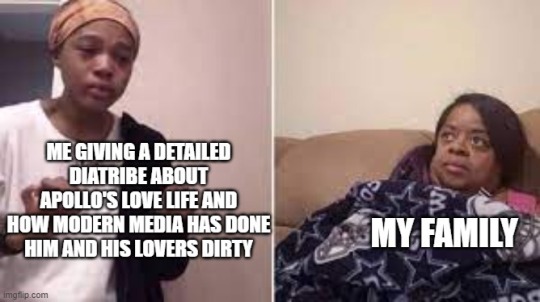
[ID: Me Explaining Me. On the left is a girl with her hands up, fingers pinched together, like she's intensely explaining something. The text over her says "Me giving a detailed diatribe about Apollo's love life and how modern media has done him and his lovers dirty". On the right is the girl's mother, wrapped up to her chin in a blanket, with a look on her face that screams "absolutely done with this shit". The Mother is labeled "My family". /End ID]
suffers in I'm the only mythology nerd in the family
#ramblings of an oracle#greek mythology analysis#apollo#greek myths#greek gods#greek myth#ancient greece#still gonna tag this as toa#just because#;)#the trials of apollo#toa#trials of apollo#tagamemnon#greek history#ancient greek#greek mythology#greek tumblr#ancient rome#ancient history#rome#greece#apollon#apollo deity#hyacinthus#hyacinth#apollo x hyacinthus#apollo and hyacinthus#cassandra of troy#the muses
1K notes
·
View notes
Text
infodump on apollo
happy sunday! heres an infodump on father phoebus
warning; nerdy

parents: zeus and leto siblings (notable): artemis (twin/older sister), many other half-siblings symbols: the sun, the lyre, the bow, laurel wreath domains: the sun, light, music, art, divine inspiration, truth, oracles, the plague, medicine, etc. children (notable): asclepius, orpheus, hector of troy, troilus of troy, aristaeus
🔆🔆🔆🔆🔆🔆🔆🔆🔆🔆🔆🔆🔆🔆🔆🔆🔆🔆🔆🔆🔆🔆
origin:
apollo's name is likely not greek, the origins are hard to find because the earliest evidence of apollo we have is in the iliad, which is written after the greek dark ages. however, his name might have come from the luwian word Apaliunas, meaning hunter, this ties him to artemis!
this also means he came from another region, like his myth, where he joined olympus from somewhere else
🔆🔆🔆🔆🔆🔆🔆🔆🔆🔆🔆🔆🔆🔆🔆🔆🔆🔆🔆🔆🔆🔆
appearance:
according to orpheus, he has golden hair.
often shown with dark skin, as shown by this image from pompeii, 1st century AD
always shown as a youthful man, either holding a lyre, a bow, or a laurel wreath.
sometimes shown,,, nude. which signified beauty and/or purity.
sometimes shown with a red or blue robe
🔆🔆🔆🔆🔆🔆🔆🔆🔆🔆🔆🔆🔆🔆🔆🔆🔆🔆🔆🔆🔆🔆
mythology (list):
birth, where all the goddesses came when he was born, and praised him. delos was covered with flowers and gold.
slaying of python
fate of niobe, where artemis and apollo killed niobe's children for her act of hubris.
building the walls of troy with poseidon.
trojan war, read the iliad.
(notable) lovers:
something to note before i say more, apollo does not have a 'sad love life', he is unmarried on his own choice. carry on.
the muses, who are calliope (goddess of epic poetry), clio (goddess of history), polyhymnia (hymns), euterpe (goddess of song), terpsichore (goddess of dance), erato (goddess of lyrical poetry), melpomene (goddess of tragic literature), thalia (goddess of comedy), and urania (goddess of astronomy)
cyrene, who he built a city for, and fathered aristaeus, and idmon
aphrodite
hecuba of troy, who he fathered many sons with, such as troilus.
hyacinthus of sparta, you know this myth.
adonis, who was also in a poly relationship with him and aphrodite
🔆🔆🔆🔆🔆🔆🔆🔆🔆🔆🔆🔆🔆🔆🔆🔆🔆🔆🔆🔆🔆🔆
again, happy sunday! have my playlist for him :)
blessed be <3
#hellenic deities#hellenic pagan#hellenism#helpol#apollo deity#apollo#its sunday yk what that means#infodump
144 notes
·
View notes
Text










💭 the nine muses: goddesses of the arts
longer post below the cut
over the next two weeks or so i'm intending to make a post on each muse to give myself an opportunity to talk a little more about their sphere of influence and domain <3 but this is a more general post about all nine mousai.
the most common tale of their origin (& the one i personally ascribe to), says that the muses are the daughters of the partnership between mnemosyne & zeus. zeus visited mnemosyne on nine consecutive nights, and a year later she bore nine children of this partnership, and these daughters were the muses.
in earlier myths, the muses were considered patron goddesses of poetry or music more generally - and in fact this is where the modern word "music" comes from, the ancient greek word mousiké meaning "art of the muses". but in the time following their origin, their sphere of influence evolves, and each muse comes to have her own respective domain in the form of a specific kind of art or humanity or science (which also gives us the word "museum" - from mouseion, or "seat of the muses".) the mousai are most chiefly associated with the following in simple terms (though most have secondary domains, which i will explore more in their individual posts):
🏛️ clio, muse of history
🪈 euterpe, muse of music
🎭 thalia, muse of comedy
🗡️ melpomene, muse of tragedy
🎼 terpsichore, muse of dance
💭 erato, muse of erotic poetry
☁️ polyhymnia, muse of sacred poetry & hymn
🌌 urania, muse of astronomy
📜 calliope, muse of eloquence & epic poetry
the mousai also collectively have associations with memory because of their mother, mnemosyne, titaness of memory & remembrance. they are said to be goddesses of knowledge in this way, in that they remember everything which has come to be. they are also said to aid in forgetting, hesiod narrated that the muses bring forgetfulness of pain & cessation of obligations. plutarch stated in some places all nine mousai were known collectively by the name mneiae (or remembrances).
in olympus, the mousai are said to perform for the other olympian deities, and are closely associated with apollo, as god of music & dance. he is sometimes said to lead the choir of the muses, or be depicted as the leader of the muses.
#✉️ . . . lorie's babble#helpol#mnemosyne#zeus#the muses#the mousai#hellenic religion#hellenic pantheon#minor goddesses#goddesses#hellenic deities
32 notes
·
View notes
Text

Calliope, Muse of Epic Poetry
Artist: Charles Meynier (French, 1768-1832)
Date: 1798
Medium: Oil on Canvas
Genre: Mythological Painting
Location: Cleveland Museum of Art, Cleveland, Ohio
In Greek mythology, Calliope is the muse of epic poetry, eloquence, music, song, and dance. She is the eldest of the nine muses, the daughters of Zeus and Mnemosyne, and is often depicted as their leader. Calliope is known for inspiring great poets throughout history, including Homer, Virgil, Ovid, and Dante Alighieri, and was often called upon for help when they were writing. She is also said to have given the gift of eloquence to kings and princes.
Calliope's name literally means "beautiful-voiced" and she is often depicted in art carrying a writing tablet and stylus, or with a lyre. She is also sometimes depicted with grapes, an aulos (an ancient Greek musical instrument), or panpipes, which may refer to her role as an agricultural goddess.
Calliope is also said to have been the mother of Orpheus, the most famous musician in Greek mythology. In some accounts, she is the daughter of Zeus and Mnemosyne, and has siblings including Euterpe, Polyhymnia, Urania, Clio, Erato, Thalia, Terpsichore, and Melpomene. She may also have had two sons with the god Apollo, Hymen and Ialemus, and may have been the mother of Rhesus, king of Thrace, or Linus, the inventor of melody and rhythm.
Calliope first appeared in Greek mythology around 700 BCE in Homer's The Iliad and continued to appear until around the ninth century.
#fine art#poetry#music#oil painting#greek mythology#muse#artist charles meynier#french art#french artist
92 notes
·
View notes
Text
Okay, so for my own fanfictions, most of which take place post-TOA and therefore post-Percy "claim your children" Jackson and Jason "honor minor gods" Grace, I made myself a spreadsheet of all the cabins I believe could plausibly be at Camp Half-Blood, and ended up with a whopping 270, and there's probably more dieties whom I couldn't find any information on, and some dieties whom I don't believe would have a cabin (ex. Kronos) (if you think I should add someone comment) and decided to paste it here, since I don't feel comfortable sharing my original spreadsheet. I did add the water dieties, even though their kids could also plausibly go to the underwater camp, but I've decided to give them the option of what camp they want. I also didn't copy their domains, but I have the list from my research, so you can ask if you'd like, I'll be glad to explain! Most of my research was from Theoi Project - Greek Mythology, and Brittanica, and probably some others I've since forgotten, so if you know any good Greek Mythology resourses and books, please share!
Here's some symbols before we begin:
* - virgin goddess. I added them because Athena and Artemis already have cabins (and Athena kids by magical means)
" - Dieties whom have faded in the series. Their cabins are more memorials to them.
Additionally there are 2 dieties named Thalia, (1) Thalia refers to the muse, the goddess of comedies, and (2) Thalia refers to the goddess of festivities and banquet
Zeus
Hera
Poseidon
Demeter
Ares
Athena*
Apollo
Artemis*
Hephestus
Aphrodite
Hermes
Dionysus
Hades
Iris
Hypnos
Nemesis
Nike
Hebe
Tyche
Hecate
Rhea
Hestia*
Calliope
Clio
Urania
(1) Thalia
Melpomene
Polyhymnia
Erato
Euterpe
Terpsichore
Musica
Persephone
Despoina
Morpheus
Epiales
Thanatos
Aristaeus
Asclepius
Epione
Hygeia
Panaceia
Aegle
Iaso
Aceso
Telesphorus
Eris
Phobos
Deimos
Peitharchia
Alastor
Alce
Hybris
Ioke
Lyssa
Palioxis
Phrice
Phyge
Polemus
Proioxis
Alala
Homodos
Cydoimus
Democracia
Dicaiosyne
Dike
Nomus
Eunomia
Pradaxide
Arete
Homonoia
Adicia
Horcus
Neicea
Poena
Bia
Kratos
Zelos
Phthonus
Agon
Anaideia
Ate
Cacia
Coalemus
Corus
Dolus
Dysnomia
Dyssebia
Oizys
Prophasis
Ptocheia
Thrasus
Soteria
Soter
Paregoros
Sophrosyne
Porus
Ponus
Plutus
Euthenia
Aedos
Aeschyne
Aletheia
Anance
Angelia
Caerus
Calocagathia
Eirene
Ececheiria
Elpis
Epiphron
Eucleia
Eudaemonia
Gelus
Eupheme
Euphrosyne
Eupraxia
Eusebia
Euthymia
Eutychia
Ctesius
Hesychia
Sophia
Techne
Eleus
Penia
Pistis
Phthisis
Pheme
Ossa
Penthus
Ania
Morus
Momus
Apate
Limus
Achos
Aergia
Adephagia
Amechania
Aporia
Geres
Eros
Aglaea
Anteros
Calleis
Charis
Harmonia
Hedone
Himerous
Philia
Philopharosyne
Philotes
Pothussexual
Hedylogus
Peitho
Amphitrite
Triton
Kymopoleia
Rhode
Benthesikyme
Aegaeus
Argyra
Calliste
Capheira
Keto
Kharybdis
Delphin
Proteus
Eidothea
Electra
Thaumas
Eurybia
Glaucus
Helle
Leucothea
Palaemon
Phorcys
Thallasa
Thoosa
Triteia
Tritonis
Tethys
Nereus
Doris
Thetis
Psamathe
Galateia
Eudora
Aeolus
Boreas
Zephryos
Notos
Euros
Khione
Oreithyia
Hesperus
EosphorusVenus
Phainon
Phaethon
Pyroeis
Stilbon
Aether
Arce
Astraeus
Asteria
Eos
Hemera
Nyx
Herse
Helios"
Selene"
Pan"
Aix"
Ganymede
Britomartis*
Oupis*
Loxo*
Hekaerge*
Ariadne
Comus
Thysa
Thyone(formally Semele)
Telete
(2) Thalia
Pompe
Epidotes
Pherespondos
Lykos
Pronomos
Pyrrhichus
Priapus
Phales
Oxylus
Nesi
Methe
Melisseus
Kortymbos
Autonoe
Eileithyia
Carmanor
Carme
Chrysothemus
Daeira
Eleusis
Macaria
Melinoe
Charon
Lethe
Acheron
Gorgyra
Cocyrys
Pyriphlegethon
Styx
Leto
Anchiale
Anytus
Dione
Epimetheus
Eurynome
Aura
Lelantos
Mnemosyne
Melete
Aiode
Perses
Phoebe
Prometheus
Theia
Themes
So that's my list. I don't really have a rhyme or reason for why each number is each, but I did clump together gods with similar domains because that's where they were easiest to find in my research... I honestly think kids of minor gods are very underused in TOA fics, and even in PJO and HOO to an extent. Jillie, my nine year old daughter of Gelus with a contageous laugh? One of my fave OCs.
As for Roman gods and goddess, I'm not as knowledgable, but hopefully I'll make a spreadsheet for plausable godly parents, though unlike CHB it doesn't need to be organized as there's just Cohorts. I don't write Camp Jupiter fics all that often, but it'll be a good resource to have if I choose to.
#camp half blood#minor gods#greek mythology#percy jackson and the olympians#heroes of olympus#trials of apollo#camp half blood cabins#percy said claim your kids jason said honor minor gods and goddesses and I went overboard with research
46 notes
·
View notes
Text
Ω PJO MISC. DEMIGOD HEADCANONS: 📚 CLIO: MUSE GODDESS OF HISTORY, LYRE PLAYING 🎶
a/n: Clio may not be the first Muse but I can respect the love of history so it was fun to write something with a power relating to history. What that is? You'll find out! Also it clearly seems whenever possible I can reference the Trials of Apollo, I will out of instinct. [PJO MISC + MUSE DEMIGOD H/CS MASTERIST: [AO3] \\ [TUMBLR]
Much like the child of Calliope, you are also a bard. However, unlike Calliope’s demigod, your specialty is lyre playing. Your fingers are more deft than them, and once you’ve played a song, you are able to remember how it goes.
With the muses, they tend to have a lot of overlap which can lead to confusion to which of the Muses specialize in; case in point where Clio and Calliope are often mistaken or placed for one or the other, so both you and the child of Calliope resemble each other the most and people will confuse you two for each other, whether as twins, cousins, or fellow half-siblings.
Unlike Calliope who sings and tells the deeds of heroes, being the demigod of the Muse of History, is different from Epics. Epics are basically telling the tales about a person, you don’t just know something about someone, you also know about everything about what was going around that time of when that person was in.
Not only does History come more easily to you, you are able to memorize past incidents and actions. Although you’re not sure if this is a factor in your memorization, with the help of music helps you along; whether remembering the music you listened to at that moment to recall back to, or memorization things based on musical notes.
You have the power of Retro-cognition; where you have visions of the past. This is basically the opposite of foresight where you see into the past and basically acts as a helpful reminder of things people may have missed. However, you know the words “Those who forget History are doomed to repeat it?” yeah that’s basically what you’re role is. You remind those of the past so they don’t repeat the same mistake, and often with people’s hubris, end up foretelling the future as such.
You’re the least compatible with Aphrodite or her children due to the Adonis incident where Aphrodite was furious with Clio, who had chided the love goddess for loving Adonis, to which Aphrodite caused her to fall in love with Pierus, son of Magnes, who later bore Hycainthus.
Hey at least you’re distantly related to Hycainthus! (though you have no idea why there’s that one kid who keeps giving you sad smiles. Meg tells you that he is reminded by someone)
You also have the slight power to peer into someone’s or something’s history. Which may deter some people but in times it is very useful. You’re often to the medical ward at camp to see how a camper got their injury and how it exactly happened. Otherwise, you are also called as a neutral party where you help settle arguments of who did what in a neutral way, before soothing everyone’s anger with your playing.
Out of the Muses, you’re the expert in Lyre playing; your fingers easily plucking in the string backs and forth, with deft fingers; as you regale of times of what once was of times of good and bad.
You’re also more adept in archery because of your lyre playing skills. Whether you have a taste for it or not, your experience and hardwork is shown in the calloused fingers familiar with string are an easy transition in archery.
#pjo#demigod h/cs#demigod headcanons#pjo imagine#demigod imagines#percy jackson and the olympians imagines#pjo imagines#pjo headcanons#pjo headcanon#pjo hc#pjo hcs#pjo muses#the muses#demigod of the muses#muses#clio#demigod of clio#clio demigod#aprhodite#meg mccaffrey#kleio
21 notes
·
View notes
Text
Pseudo-Apollodorus, Bibliotheca 1. 16 : "Aphrodite, furious with Kleio (Clio) (who had chided her for loving Adonis), caused her to fall in love with Magnes' son Pieros (Pierus). As a result of their union she bore him a son Hyakinthos (Hyacinthus)."
I'm sorry but... Clio is the Muse of History. She's a historian, Aphrodite!
How do we know that after the entire incident Clio didn't make sure that Aphrodite will remain remembered for all her hardly admirable moments? Or that she didn't exaggerate or change anything in order to portray her in a worse light?
8 notes
·
View notes